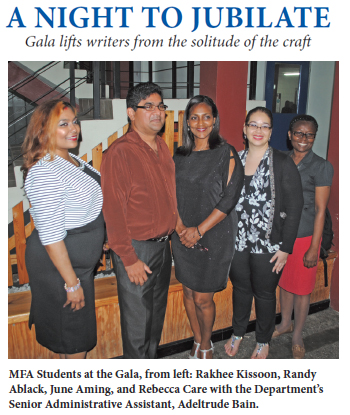
 In hushed tones, a motley crew of students, lecturers and literary enthusiasts gathered in the Centre for Language Learning (CLL) Auditorium on April 7 for the 19th annual Campus Literature Week Gala Reading and Closing Ceremony under the theme, Create Life. Write. In hushed tones, a motley crew of students, lecturers and literary enthusiasts gathered in the Centre for Language Learning (CLL) Auditorium on April 7 for the 19th annual Campus Literature Week Gala Reading and Closing Ceremony under the theme, Create Life. Write.
As is customary, first-year students from the MFA in Creative Writing programme managed the evening’s festivities with Rakhee Kissoon and June Aming serving as Masters of Ceremonies. Head of the Department of Literary, Cultural and Communication Studies Dr. Maarit Forde emphasised the two distinct phases in the process of writing – solitary and social and the need for events like the gala that allow writers to “immerse themselves in the worlds they create.”
New MFA programme coordinator, Dr. Muli Amaye requested a moment of silence to reflect on the loss of one of their own, Dr. Giselle Rampaul – an instrumental figure in shaping Campus Literature Week well beyond its humble beginnings. Amaye paid tribute to Rampaul, Sir Derek Walcott and other literary figures who passed away in 2017 by reciting one of her own poems, “A Gift” that showed the capacity to love. As a teaser to the night’s featured reading by Writer-in-Residence, Courttia Newland, the Department of Creative and Festival Arts’ (DCFA) activism and educational-based dramatic ensemble, Arts-in-Action (AiA) performed their interpretation of stories taken from an anthology featuring Newland’s work and other male writers – Being Dad: Short Stories About Fatherhood reimagined as “Faddacity” much to everyone’s delight.
Before immersing the audience in the 1980s black British hip hop scene, Newland also honoured the shining lights of Caribbean and British literature that had been too quickly extinguished with a reading of Derek Walcott’s poem, “Love after Love.”
He radically changed the mood with his energetic reading of “Soundboys” which the audience unanimously agreed during the Q&A portion was “incredible.” People readily linked Newland’s crafted Caribbean household to their lived experience and expressed great interest in reading more diasporic tales of Caribbean immigrants in London.
(Jeanette Awai)
|





